Dear Friends,
Another few busy days at the Capitol with full committee schedules and the opportunity to present a few of my bills. As always, I especially enjoyed the awesome opportunity to visit with many of you who made the trip down to the Capitol to advocate and get involved in the legislative process. Please take a few minutes to read some of the highlights from the past week.
Covid-19
This week a bipartisan bill was introduced in the Senate aimed at providing additional funding and streamlining preparation in the event the COVID-19 virus reaches Minnesota. The legislation calls for an immedate $5 million appropriation into the Public Health Response Emergency Account.
We are fortunate in Minnesota to have such an excellent public health system including one of the best public health labs in the country. Public health officials have already begun taking measures to ensure Minnesota is ready for a coronavirus outbreak.
The advice from the experts continues to be basic viral avoidance:
- Wash hands frequently and thoroughly
- Don’t shake hands
- Don’t touch your face
- Cover your cough (not in your hand)
- Stay home if you are sick etc.
Stay tuned to the latest updates from the Minnesota Department of health here.
Higher education finance and policy
On Tuesday, I had the opportunity to present on a bill which I chief-authored, on behalf of the University of Minnesota. SF 3665 would authorize the University of Minnesota to refinance debt taken out by the University to construct the Biomedical Discovery District buildings on the Twin Cities campus.
Refinancing the debt at a lower rate would allow the University to capture the savings and apply them toward the design, site acquisition, and preconstruction of the Clinical Research Facility, also on the Twin Cities campus.
With many Minnesota homeowners taking advantage of low interest rates to refinance the mortgages on their homes, the University seeks a similar approach with the bonds for the Biomedical Discovery District.
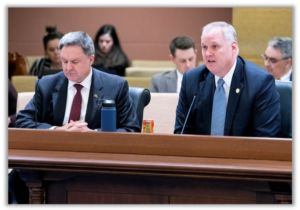 On Thursday, we had the opportunity to hear reports from the University of Minnesota and the Minnesota State system on the tuition cost of online education, especially as compared to tuition rates for traditional education. SF 3665 passed out of the Higher Education committee and was re-referred to finance.
On Thursday, we had the opportunity to hear reports from the University of Minnesota and the Minnesota State system on the tuition cost of online education, especially as compared to tuition rates for traditional education. SF 3665 passed out of the Higher Education committee and was re-referred to finance.
Online tuition rates are consistently higher than tuition for a classroom-based education. In almost every industry and segment of society technological disruption and innovation has brought costs down for the consumer. That has not yet been the case for Higher Education. It is incumbent upon us as policymakers to ask why and look for solutions that will increase access and affordability for our students and family members.
We also heard an update from the Office of Higher Education on educational attainment rates in Minnesota. Current estimates show that 62.2% of Minnesotans aged 25-44 years completed a postsecondary credential. The report demonstrated that Minnesota is making progress toward the Legislature’s goal of 70% educational attainment by 2025. In 2015, the first year after the goal was established, the educational attainment rate was 57.7%.
E12 education finance and policy
This past Monday, I had the opportunity to present SF 2259 which extends eligible eLearning Days for schools districts in Minnesota from five to 10 days, as well as add 10 days of eligible eLearning days in the event of public health emergency which causes school closures.
In 2017 the Legislature passed legislation to allow school districts or charter schools – if they choose locally – to provide up to five eLearning days after consultation with their teachers or teacher representatives.
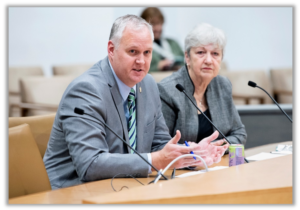 E-Learning days are intended to provide access to learning on days when there are school cancellations due to inclement weather. While these days cannot replace the face-to-face time students have with their teachers, it can provide continuous learning when school is cancelled. E-learning days also eliminates the need for makeup days at the end of the school year – keeping our students on track and helping families plan summer activities.
E-Learning days are intended to provide access to learning on days when there are school cancellations due to inclement weather. While these days cannot replace the face-to-face time students have with their teachers, it can provide continuous learning when school is cancelled. E-learning days also eliminates the need for makeup days at the end of the school year – keeping our students on track and helping families plan summer activities.
Deborah Pauly, President of the Minnesota School Board Association, joined me in support of the bill to provide additional testimony.
Capital investment committee Presentation
On Tuesday, I presented my bill in support of reconstruction and expansion of the Avivo Regional Career and 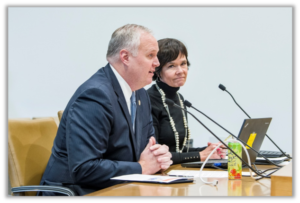 Employment Center project to the Capital Investment Committee. SF 778 is a $1.79 million bonding request for Phase 1 of the project. Joining me to provide testimony was Kelly Matter, Avivo’s President and CEO.
Employment Center project to the Capital Investment Committee. SF 778 is a $1.79 million bonding request for Phase 1 of the project. Joining me to provide testimony was Kelly Matter, Avivo’s President and CEO.
Avivo is a non-profit organization that increases the well-being of individuals by pairing chemical dependency and mental health services with career education training and employment services. This work helps Avivo’s clients achieve recovery, employment, and career advancement.
Avivo supports nearly 13,000 individuals and their children annually, with nearly 3,000 individuals entering careers and employment, and 2,000 people moving off welfare. Ninety-six percent of people Avivo serves lives in extreme poverty.
Avivo specializes in serving people with the greatest barriers to success, including homelessness, mental illness, substance use disorder, chronic unemployment, and poverty.
Avivo’s facility has endured 60 years of high-traffic public use since it was built in 1960. The facility has substantial capital needs and has become inadequate to meet the current and future demands of serving the community.
This bonding support would greatly enhance Avivo’s ability to continue fighting homelessness, develop the State’s workforce, fight the opioid epidemic, and help improve individual’s economic situation.
Constituent visits
One of the highlights of representing the communities of Plymouth, Minnetonka and Woodland, is meeting with constituents, hearing what’s important to them, and working on behalf of them and their families. Here is a just a small number of the constituents who I met with this week in St. Paul.
Joe and Scott were in St. Paul on Tuesday with Back Country Hunters and Anglers for their annual advocacy day at the Capitol. Great discussion about fighting Chronic Wasting Disease, bonding requests for natural resources, public access to land and lakes and their concerns for mining in the Boundary Waters.
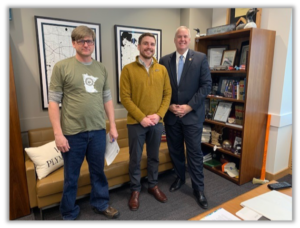
On Wednesday, I met with constituents with Safe Passage for Children of Minnesota. Safe Passage for Children is a citizen’s group that advocates for improvement in Minnesota’s child welfare system. Mike, who is from Minnetonka, is an author and long-time advocate for children.
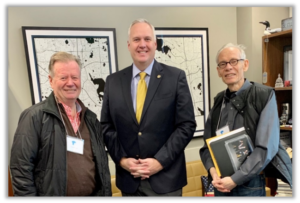
On Thursday, Plymouth residents, Greg and Robert, were at the Capitol to advocate on behalf of the Minnesota Bicycle Alliance and stopped by to discuss policy related to bike and riding rules, including the need for major work on Conty Road 47 in Plymouth. This was Greg’s fourth year in a row to come and visit me in St. Paul and share his passion for biking and access and safety for riders.
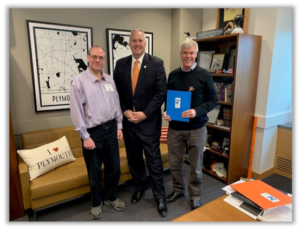
Members from the Minnesota Nursery and Landscape Association (MNLA) discussed their priorities for the session and talked about the importance of their industry in the state of Minnesota. The MNLA represents over 1,100 companies and 41,500 employees across our state, and has a $3.5 billion direct effect on Minnesota’s economy each year.
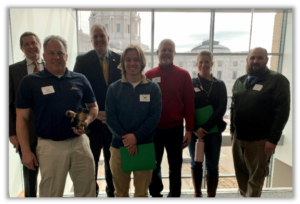
Constituents from the Minnesota Bankers Association (MBA) visited my office as part of MBA’s Bank Day at the Capitol on Thursday afternoon. Great to hear how the economy in Minnesota continues to grow, and how consumers and the financial services industry is impacted by the current tax environment in our state, and how in their perspective proposed legislation at the Capitol will impact all of us.
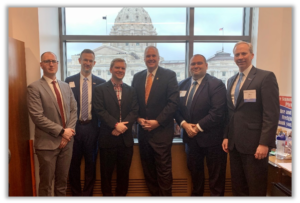
Thank you to Rabbi Harold Kravitz of Adath Jeshurun Congregation in Minnetonka for opening the Minnesota State Senate in prayer this past Monday. It has been a pleasure to work with Rabbi Kravitz on a number of issues including his previous work as Board Chair of MAZON USA.
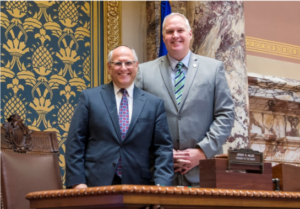
Closing thoughts
Thanks for reading this week’s update. With four weeks remaining until our Easter/Passover break, and our third deadline for bills, the session is moving along at a fast pace. Our constitutional adjournment date this year is Monday, May 18, which gives us just ten weeks until we will be done for the session. There continues to be important topics being discussed daily, including the state’s preparedness for a potential coronavirus outbreak. Thank you for reaching out with your own thoughts and concerns for legislation and decisions being made at the Capitol. I truly appreciate the engagement of everyone, whether we agree or disagree on an issue. Although we may have differences in opinions, I do believe we have far more that we agree upon, than disagree.
In the days and weeks ahead, please don’t hesitate to reach out to my office if I can be of service with any state or legislative issue.
Sincerely,

